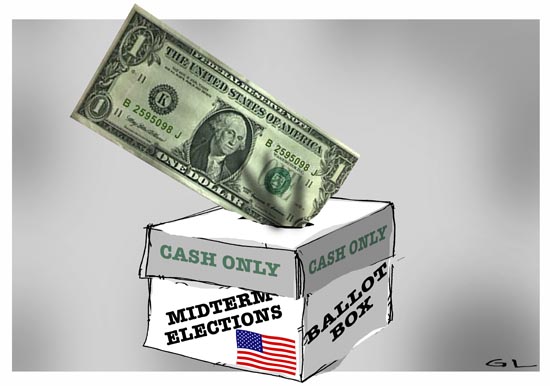Search
Recent comments
- empire's end....
3 hours 5 min ago - collective self-harm....
5 hours 21 min ago - anti-NATO....
5 hours 29 min ago - victory....
9 hours 33 min ago - anti-trumper....
11 hours 25 min ago - "with love".....
11 hours 29 min ago - confusion....
11 hours 15 min ago - political logic.....
13 hours 41 min ago - pacific wars....
23 hours 48 min ago - tempting the nazi nut....
1 day 4 hours ago
Democracy Links
Member's Off-site Blogs
votes for cash for votes...

Drowning in Campaign Cash
Shrill political attacks have saturated the airwaves for months, but behind them is the real problem of this demoralizing election: the dark flow of dollars, often secretly provided by donors with very special interests.
The amount is staggering: Nearly $4 billion is likely to be spent once the final figures are in, according to the Center for Responsive Politics, far more than in the 2006 midterms, which cost $2.85 billion. It could even eclipse the $4.14 billion spent in the 2004 presidential campaign.
Much of this is a direct creation of the Supreme Court under Chief Justice John G. Roberts Jr., which has cut away nearly all campaign finance restrictions.
The court’s 2007 decision in Wisconsin Right-to-Life gave corporations and unions the right to run advocacy ads in the last 60 days of a campaign — as long as they did not expressly advocate the election or defeat of a specific candidate. This year’s Citizens United decision effectively ended even that last restriction, and pulled away all limits on corporate spending in campaigns.
Building on those decisions, political operatives — mainly Republicans — decided they could collect unlimited amounts of money through independent, tax- exempt organizations known as 501(c) groups, without revealing the source of the donations.
By offering anonymity and no limits, these groups (with gauzily apolitical names, like American Future Fund and American Action Network) have been able to raise and spend extraordinary sums. In the 2006 midterms, outside groups not affiliated with political parties spent $51.6 million; so far this year, such groups have spent $280 million. About 60 percent of that spending is from undisclosed donors, most of which has benefited Republicans. Democratic candidates raised huge amounts, but the sources for most of it were disclosed.
Combining both traditional and outside money, Republicans have slightly outraised Democrats, $1.64 billion to $1.59 billion, but there is more to be tallied.
While large secret donations have been legalized, it is not clear that the 501(c) groups spending the money on barrages of attack ads are playing by the last, threadbare rules. The tax code requires that these groups not be “primarily engaged” in political advocacy, but neither the Internal Revenue Service nor the Federal Election Commission has made any apparent effort to investigate what other purpose they might have. Some groups have suggested they would begin nonpolitical activities — after the election.
http://www.nytimes.com/2010/10/31/opinion/31sun1.html?_r=1&hp=&pagewanted=print
- By Gus Leonisky at 31 Oct 2010 - 6:10pm
- Gus Leonisky's blog
- Login or register to post comments
on no pay for the payments...
The US broadcasting network MSNBC has suspended prime-time host Keith Olbermann for making political contributions.
The Politico news website said he had contributed to the campaigns of three Democratic candidates.
MSNBC President Phil Griffin said Olbermann had been suspended without pay.
During coverage of the US mid-term elections, Olbermann was one of the network's key presenters.
"Mindful of NBC News policy and standards, I have suspended him indefinitely without pay," Mr Griffin said, according to a statement quoted by the Huffington Post.
With Rachel Maddow, Olbermann has been one of the most prominent hosts on the network, which analysts say has come to be seen as liberal-aligned.
The BBC's Jonny Dymond, in Washington says that while America's 24-hour news channels are increasingly politicised and polarised, it appears there is a limit.
http://www.bbc.co.uk/news/world-us-canada-11702720
No such dilemma for Uncle Rupe...